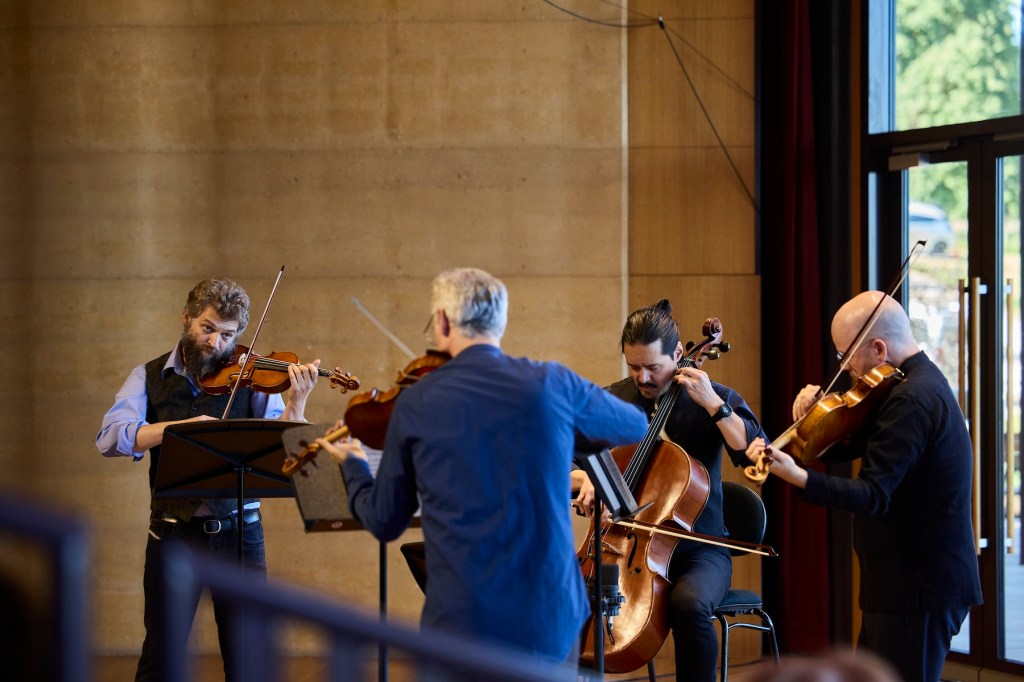In case one is not up to speed with things at Mount Barker Summit, UKARIA Cultural Centre has rebranded its annual flagship chamber music weekend event formerly known as UKARIA 24, renaming it Chamberfest. And it is fair to say that the flag has been hoisted higher than perhaps ever before by its curator, Brooklyn Rider.
To get a sense of this string quartet from New York, they resemble Kronos Quartet in general terms but lift the game of string quartet playing to an even higher technical plane. No less exploratory to that landmark group (which incidentally underwent major changes of personnel in 2024), Brooklyn Rider sit right at the pointy end of quartet playing: their sound is similarly lean and extremely highly finished, but even more so; and the kind of music they play spreads seemingly limitlessly across new classical, world music and contemporary styles.
Having been at it for two decades, they may be counted as originals. Basing their name on the 1910s expressionist art movement The Blue Rider, and seriously into global music by virtue of their direct connections with Yo-Yo Ma’s Silk Road Ensemble, they have pretty much become the benchmark of what the string quartet means in the 21st century.
Traversing styles and centuries, Philip Glass, John Cage and Beethoven were central to the menu of their third concert, ‘Healing Modes’. Here was the first discovery, for nothing here was brittle or bloodletting on the eardrum. Immediately in Cage’s ‘In a Landscape’, a Zen-like stillness took hold in this piece of dreamy simplicity and slowly ascending modal scales – it’s rather like Erik Satie.
By now certain things were becoming apparent. This American group is fanatical not just about tuning and timing, but also weight and resonance of sound. This piece by Cage is normally played on solo piano or harp, and for string quartet it depends utterly for its seamlessly hypnotic effect on how exactly the players can share its arpeggiated figures. Thankfully, note placement was nigh-on-perfect. Meanwhile, faultless pizzicato from one of the violins called to mind the delicate timbres of Indonesian gamelan music – a known source of Cage’s inspiration.
The only omission was dancing. Cage specifically composed ‘In a Landscape’ with a dancer in mind, but alas choreography was absent on this occasion. (Brooklyn Rider did bring a couple of dancers out to Chamberfest for the fourth concert, but they were not included in this Saturday evening program.)
But there were ample rewards, nonetheless, including three commissioned works that revealed much about Brooklyn Rider’s carefully evolved aesthetic. Evan Ziporyn’s Chinese-inspired ‘Garden from Qi’ was the first, and its gently pulsing dance rhythms were highly attractive. Most distinctive though were its ‘squeezebox’ effects, in which all four instruments slide onto each other in successive waves of sound. Amazing to hear, this sound that genuinely extends upon what normally the string quartet medium can achieve.
Reena Esmail’s ‘Zeher’ is a vivid piece that is more illustrative of injury than this concert’s theme of healing. Its title translating to ‘poison’, it consists of microtonal guttural wailing in the cello, interspersed by intense sforzando bowing from the full ensemble. The contrasts in this performance were vast and wide. Another winner was Caroline Shaw’s vivacious ‘Schisma’, making full use of folk-style bowing and glissando, pizzicato and bow-tapping effects. This piece asks for nothing less than the most inscrutable timing, and Brooklyn Rider gave it just that.
Sandwiched between these smartly turned-out contemporary compositions, one feared for the ‘survivability’ of Beethoven and the deep interior of the ‘Heiliger Dankgesang’ slow movement from his String Quartet No. 15, Op. 132. Somehow a different ethos and sound world was beckoning compared with the zealous technical sheen demanded by these new pieces. Yet violinists Johnny Gandelsman and Colin Jacobsen, violist Nicholas Cords, and cellist Michael Nicolas are clearly highly intelligent musicians, and their intellectual command brings undeniable insight to Beethoven.
In this work, the composer gives thanks to his return to health and his reinvigorated creative powers following a long bout of illness. Brooklyn Rider’s aesthetic is cool but profound, and other groups may give Op. 132 more of a singing line, but in terms of psychological penetration and sheer sonic transparency, this performance felt in a class of its own. For a work written exactly 200 years ago, it felt unprecedentedly new.
Where numerous other groups mask over tuning errors with layers of vibrato (that universal cover-up), Brooklyn Rider adds none except where it deliberately chooses to do so: they don’t need to. This showed particularly in Philip Glass’s String Quartet No. 4, ‘Buczak’, a work that demands super-critical tuning because its conception is basically pianistic. Brooklyn Rider, who make a specialty out of Glass’s music, are able to roll out its arpeggios with unparalleled accuracy and flow. There was nothing mechanical about it, and one came away with keener admiration for this minimalist composer.
Brooklyn Rider push the classical contemporary envelop far beyond the familiar, and they are true untouchables in the world of string quartet playing.
This is a review of Brooklyn Rider’s third concert, Healing Modes, performed at UKARIA Cultural Centre on November 1 as part of Chamberfest 25
